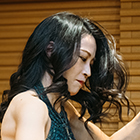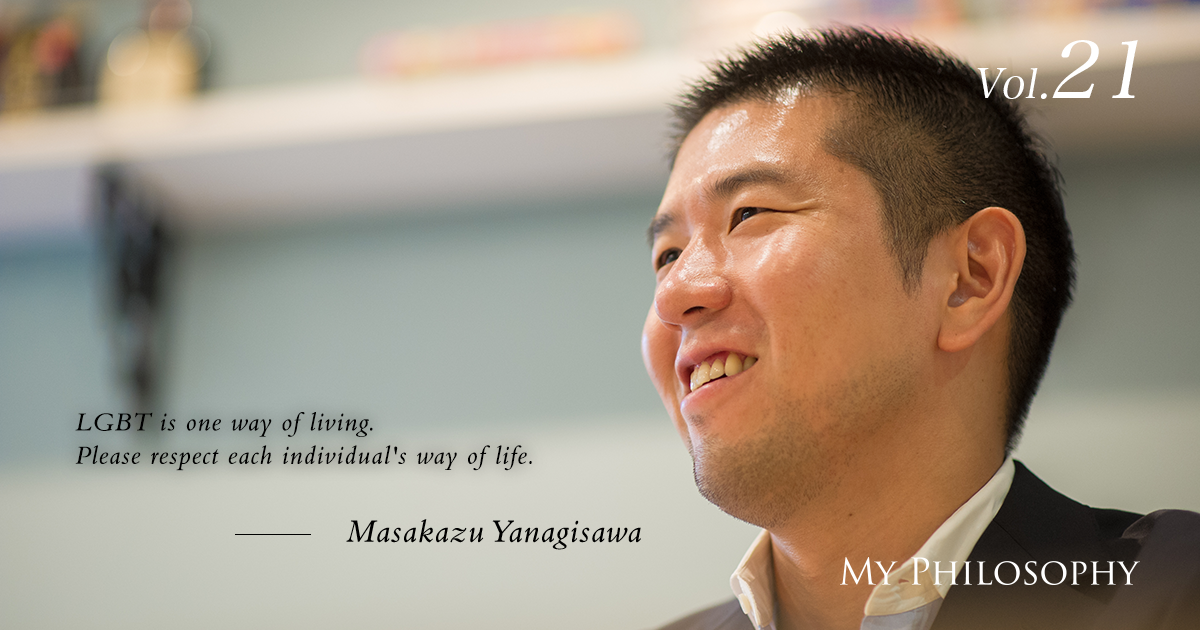
We spoke with Masakazu Yanagisawa, who is actively engaged in various initiatives aimed at creating an LGBT-friendly society. We discussed his experiences with coming out and his goals for the future.
Profile
Vol.21 Masakazu Yanagisawa
Director of Global Prime Finance Sales at Deutsche Securities Inc. | Board Member of NPO good aging yells
Masakazu Yanagisawa graduated from Keio University with a degree in Policy Management. In 2011, he became the first manager of the "Colorful Café" in Hayama, Kanagawa Prefecture, a café designed to be a comfortable space for both LGBT and non-LGBT individuals. The following year, at TEDxTokyo, he spoke about his experiences and publicly came out as gay. This speech, which was broadcast worldwide via the internet, was reported as one of the largest coming-out events globally. Subsequently, he participated in the "work with pride project," advocating for workplace recognition of LGBT individuals and proactive initiatives by corporations. At Deutsche Securities, where he works, he launched dbPride Tokyo in November of the same year, a network for LGBT employees and their allies (ALLY).Additionally, driven by a desire to extend the concept of a space where individuals can be themselves into the realm of education, he is a board member of the preparatory foundation for the International School of Asia, Karuizawa (ISAK) in Nagano Prefecture, which is set to be Japan's first full-boarding international school. He is also currently writing a series called "LGBT Frontline" for Toyo Keizai Online.
*The titles and positions mentioned are as of the time of the interview in October 2013.
What are sexual minorities?
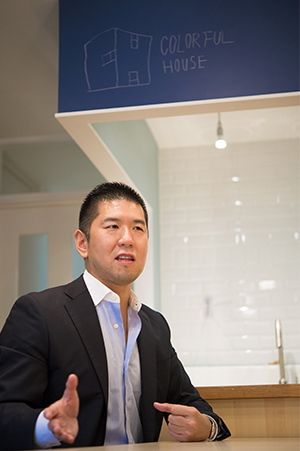
LGBT stands for Lesbian, Gay, Bisexual, and Transgender, representing various types of sexual minorities. Lesbians, gays, and bisexuals are individuals attracted to the same sex. Transgender people feel a discrepancy between their gender identity and physical sex, and their attractions can be towards the same sex, the opposite sex, or both. Sexuality is not black and white; it has gradients where some may not know their own gender, or whom they are attracted to, and many do not fit neatly within the LGBT category. Although LGBT is a significant part of sexual minorities, it fundamentally represents all sexual minorities.
I have continuously questioned who I am and learned through personal experience. Since no one taught me, I started by browsing magazines in bookstores, thinking, “So, this world exists. Maybe I am also like this.” In recent years, support has improved, with dedicated support centers and suicide prevention hotlines for each group. Unlike in Singapore or Islamic countries, being LGBT is not illegal in Japan. There are many countries where being LGBT is illegal, often because it contradicts Christian teachings, as in parts of the United States. The Japanese government is relatively LGBT-friendly and has been proactive in supporting hotlines and NGOs with subsidies.
Coming out to parents
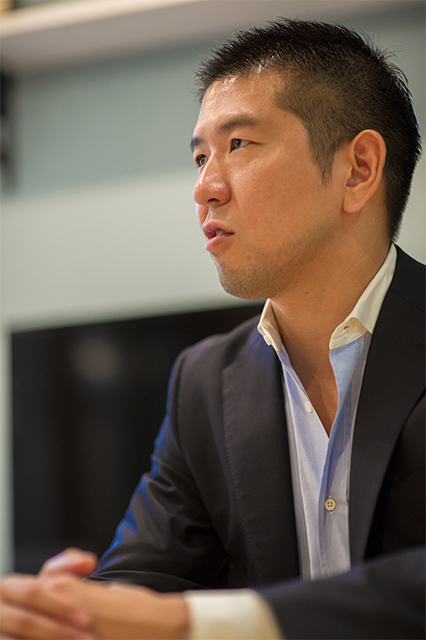
At a previous job at a foreign financial institution, I was often asked to bring my girlfriend to barbecues. I would internally replace “boyfriend” with “girlfriend,” but once I accidentally said “my boyfriend” instead. The room went silent. However, my boss, a woman, casually said, “Bring him next time,” which made me feel at ease. She told me it didn’t matter whether I dated men or women. Before coming out, I felt deeply hurt whenever I overheard others speculating about someone being gay, worrying they spoke of me the same way. After coming out, people stopped making gay jokes out of consideration for me.
I believe my parents had always suspected me of being gay. When I tried to confess in my second year of working, I began to cry before I could finish saying “actually.” They guessed it might be about that, and became flustered trying to comfort me as I cried uncontrollably. They admitted they couldn’t fully understand my feelings and that it might take time, or they might never fully understand, but affirmed that no matter who I loved, I would always be their son. Having heard stories of others being disowned, their acceptance transformed my tears of fear into tears of joy, and I couldn’t stop crying.
Aiming for an LGBT-Friendly Workplace
When planning my speech for TEDxTokyo, I decided not just to talk about the “Colorful Café,” but also about my personal experiences. Especially for the LGBT community, it was important to come out at TED to show that I had come out and was leading a very enjoyable life without any problems.
The response after coming out was tremendous, leading to the creation of an LGBT-friendly shared house. At the after-party, I met someone from Share Design Inc., and when I shared that my organization, good aging yells (hereafter referred to as “Good”), envisioned a space where both LGBT and non-LGBT individuals could live authentically even after coming out, they were eager to collaborate. Within just eight months, together with the Good team and the staff at Share Design, we opened “Colorful House.”
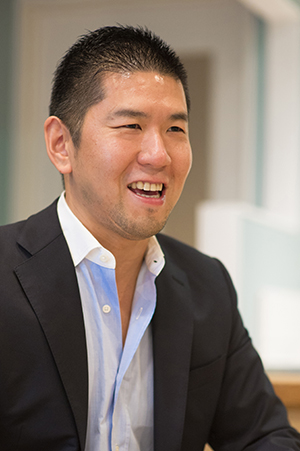
A shared house is a place to live, and a café is a place to relax, but the place where we spend most of our time during the day is at work. It’s crucial to have a fulfilling job where you can be yourself. Thus, transforming the workplace environment is my current focus. This month, on November 22nd (Friday), with the help of Sony Corporation providing the venue, we are hosting an event for HR departments to discuss diversity management related to LGBT issues. A previous survey by Dentsu Institute found that about 5% of the population are sexual minorities. Every company has LGBT employees. If they can be themselves, they can perform better and thrive. I hope people will learn this. The fact that Sony, a Japanese company, is starting to tackle this issue has significant implications for other companies. I wish for many companies to respect the lifestyle of being LGBT.
My goal is first to engage various companies. Another goal is to create an office with my colleagues at Good, where both LGBT and non-LGBT individuals can be themselves. There’s no exact statistic, but it seems many LGBT individuals are in professions like lawyers, tax accountants, and certified public accountants. It may be challenging for them to work as regular employees in large organizations, leading many to become independent. At Good, we plan to create a shared office where such individuals can gather.
Speaking Out Continuously Gathers Allies
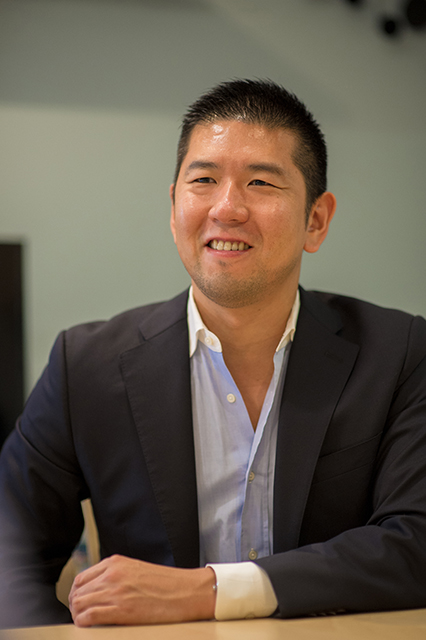
When I expressed a desire to start a café, someone offered me the use of this place, and that’s how the Colorful Café was born. Talking about the café led someone to suggest we create a living space, which resulted in the opening of a shared house. Similarly, Sony approached us to collaborate on improving the workplace environment. I’ve come to realize that speaking out is crucial. When you express a desire to achieve something, you meet people who empathize and want to join you. A useful aspect of Facebook is that you can limit your posts to just your friends. Similarly, in the Colorful House, you can choose to come out just within that community. Starting by sharing within a comfortable space is a good approach.
Previously, coming out seemed to carry the pressure of having to declare “I am gay” to everyone around you all at once. Instead, it’s okay to take it step by step, gradually expanding the range where you feel comfortable. Eventually, this can lead to a world where you can be yourself openly. I want to create places and systems to facilitate this. Personally, I want to marry and have children in the future. At 36, I see my gay and lesbian friends abroad starting families. In Japan, same-sex couples still cannot adopt children. In the US, about one in seven same-sex couples have children, and it’s becoming a norm for same-sex couples to have children. With the rapid changes in society lately, perhaps Japan’s situation will change too. I’ll wait and see how things evolve over the next few years. There’s an age limit to having children, so if things don’t change, moving abroad is another option I’m considering.
work with pride 2013 “LGBT and Japan’s Workplace, Challenges, and the Future”
- Date and Time:
- November 22, 2013 (Friday), 15:30 – 17:30
- Organizers:
- Work with Pride (Japan IBM, International NGO Human Rights Watch, NPO good aging yells, NPO Nijiiro Diversity)
- Venue:
- Sony Corporation, Sony City Osaki, Conference Hall A
- Contact:
- NPO good aging yells EB43746@jp.ibm.com (Japan IBM Diversity)
- As featured in Toyo Keizai Online “LGBT Frontline”
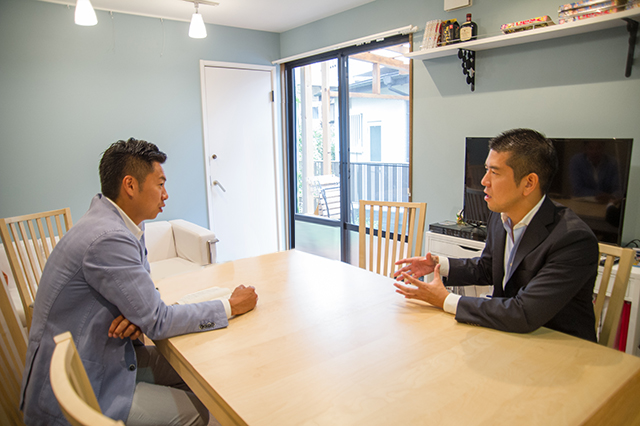
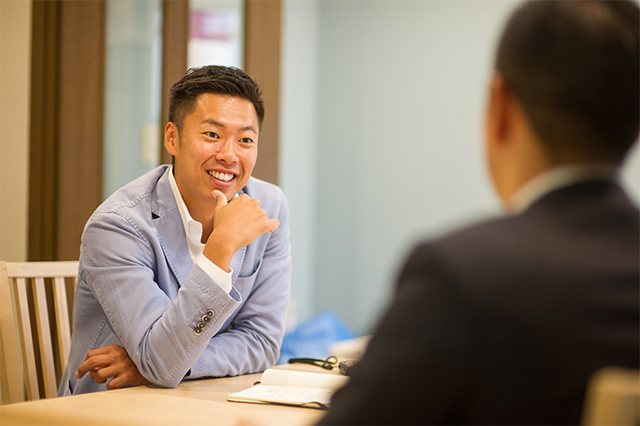
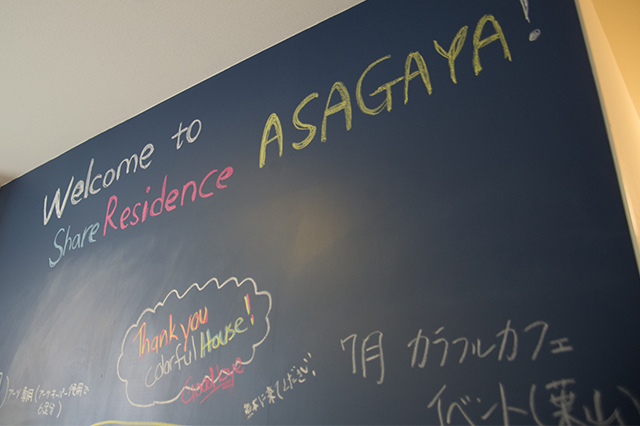
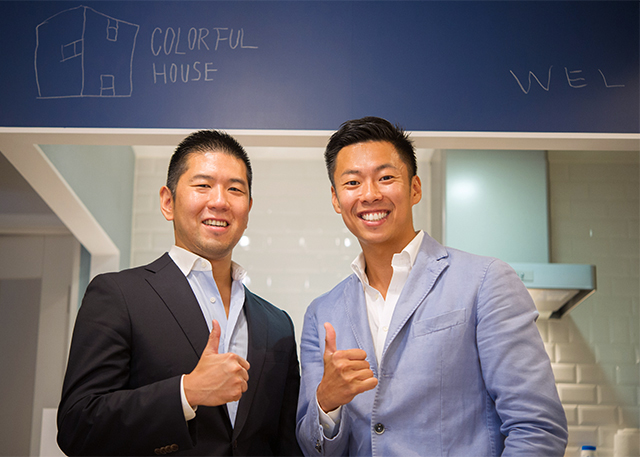
I decided to interview Masakazu Yanagisawa after being moved by the film “42—The Man Who Changed the World,” which tells the real-life story of Jackie Robinson, the first African American Major League Baseball player. I met Mr. Yanagisawa through Human Rights Watch; he is both a university senior and a friend. While LGBT issues are not well-known in Japan, it is important to know and understand. We featured Mr. Yanagisawa to introduce both his personality and the current state of LGBT matters to a wider audience.
“Knowing oneself and living authentically” are, I believe, the most important aspects of life. Mr. Yanagisawa’s coming out during a TEDx Tokyo presentation, in front of an audience of 400 and thousands more online, was a significant breakthrough for him. Having grown up in New York and been exposed to various philosophies and ways of living, I was deeply moved by his commitment to living authentically.
Living as one’s true self is a true joy. I empathize with the motto “Work with pride, live with pride,” and will continue to support LGBT activities in the future.
September 2013, at Colorful House Edited by Naomi Kusuda Photography by Daiki Ayuzawa





